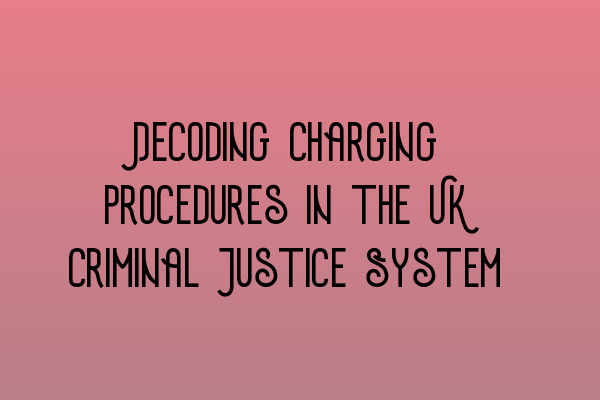Decoding Charging Procedures in the UK Criminal Justice System
The UK criminal justice system operates within a complex framework of laws and regulations. One important aspect of this system is the charging procedure, which outlines how a person accused of a crime is formally charged. Understanding the charging procedure is crucial for anyone involved in criminal law practice, as it forms the foundation for building a strong defense or prosecuting a case effectively.
In this article, we will demystify the charging procedure in the UK criminal justice system and provide insights into its various facets.
Understanding the Charging Process
The charging process typically begins when law enforcement officers suspect that a crime has been committed. They gather evidence and interview witnesses to build a case against the person they believe is responsible. Once they have gathered sufficient evidence, they refer the case to the Crown Prosecution Service (CPS) or, in Scotland, the Crown Office and Procurator Fiscal Service (COPFS).
The CPS and COPFS review the evidence and decide whether there is enough to charge the suspect. If they determine that there is, they will issue a Charge Sheet, which outlines the specific offenses the person is being charged with. The Charge Sheet contains essential information such as the defendant’s name, the date and location of the offense, and a description of the alleged crime.
It’s important to note that the charging decision is made by the CPS or COPFS and not by the police. The CPS and COPFS have the discretion to determine whether there is a realistic prospect of conviction and whether it is in the public interest to prosecute.
Categories of Offenses
Offenses in the UK criminal justice system are grouped into three main categories: summary offenses, either-way offenses, and indictable-only offenses.
- Summary Offenses: These are less serious offenses that are tried in the magistrates’ court. Examples include common assault, minor theft, and disorderly conduct. Summary offenses have a maximum penalty of 6 months’ imprisonment and/or a fine.
- Either-way Offenses: These offenses can be tried either in the magistrates’ court or the Crown Court, depending on their seriousness. Examples include burglary, drug trafficking, and assault causing actual bodily harm. The maximum penalty for either-way offenses varies depending on the specific offense.
- Indictable-only Offenses: These are the most serious offenses, such as murder, rape, and large-scale fraud. They can only be tried in the Crown Court. The penalties for indictable-only offenses are typically more severe.
Once the charging decision is made, the defendant will be notified of the charges against them and summoned to appear in court.
The Role of a Criminal Defense Solicitor
When someone is charged with a criminal offense, seeking legal representation is crucial. A criminal defense solicitor plays a crucial role in ensuring a fair trial and protecting the rights of the accused.
A skilled criminal defense solicitor will review the evidence, challenge the prosecution’s case, and advise the defendant on the best course of action. They will also ensure that proper procedures have been followed during the charging process and throughout the legal proceedings.
If you need expert legal advice and representation for a criminal case, SQE Criminal Law & Practice Law UK can provide you with experienced criminal defense solicitors who will fight for your rights.
Conclusion
Decoding the charging procedures in the UK criminal justice system is essential for anyone involved in criminal law practice. It is a complex process that determines how individuals accused of crimes are formally charged. Understanding the categories of offenses and the role of a criminal defense solicitor can help both defendants and legal practitioners navigate the system effectively.
For more information and resources on SQE criminal law and practice, check out the following related articles:
- SQE 1 Practice Exam Questions
- SQE 1 Practice Mocks FLK1 FLK2
- SQE 2 Preparation Courses
- SQE 1 Preparation Courses
- SRA SQE Exam Dates
